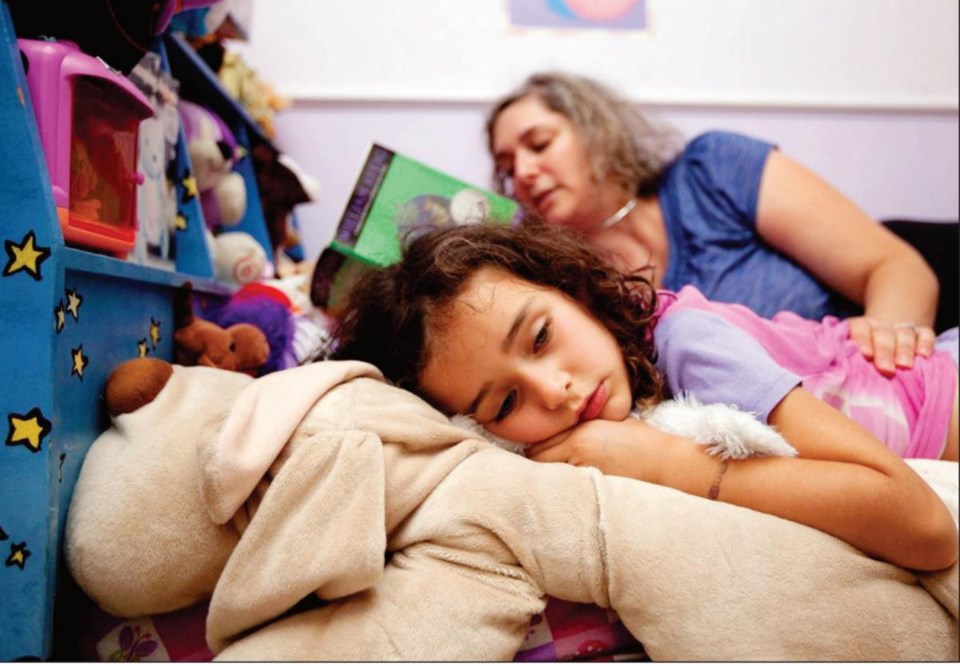When her 12year-old son returned from overnight camp earlier this summer, Ariana Birnbaum didn't wait long to re-establish his sleep schedule.
After three weeks away from home - where he hit the hay at least two hours later each night - Birnbaum was keen to bring Mason back in line with his regular sleep pattern.
Hours after Mason's lunchtime arrival from camp, the pair sat down and decided on a plan: he would head to bed 15 minutes earlier each night until he returned to his regular bedtime.
"It worked out well and I don't think he feels like all of a sudden he went to bed two hours earlier," said Birnbaum, founder of Becoming Maternity and Parenting Centres in Toronto. "It's a much easier concept to accept if you do it in smaller sort of increments."
Routine is a key sleep mantra for the mother of three - and not just for her own brood. Birnbaum runs group sleep workshops and one-on-one private sleep consultations.
While daughters Eden, 9, and Noa, 5 1 /2, attended camp, Birnbaum said they didn't stray much from the regular nighttime routine.
But ahead of a two-week family holiday, she was bracing for their typically structured sleep schedule to get slightly off-track and was already gearing up to correct course when they returned - albeit gradually.
She has similar advice for fellow parents regarding re-establishing the sleep routine. Easing into it is the best course, she said. "Starting a week or so before school's going to start, [you should be] sitting down with the kids and saying: 'School's going to be starting - soon you're going to have to wake up a lot earlier,' " said the 42-year-old.
"Then, slowly, [make] the bedtimes slightly earlier and [go] back to that routine that they had - during school, where maybe things kind of loosened up. I think that works pretty well."
Jennifer Garden is founder of Sleepdreams, a Vancouver-based company specializing in sleep consultations for children. The registered occupational therapist says a pivotal tool in the sleeptime arsenal is having a wind-down routine prior to bed.
"TV - or screen time in general - is just flashing, blue [and] white lights and it's very stimulating to the brain," Garden said. "So if they can, move all of those pieces earlier and just have some quiet, settling-down time with no roughhousing or playing, and reading some books and singing songs."
Garden said other meth-ds to help in the dozing-off rocess include keeping darkened rooms at a cool temperature, which helps kids to drop to Stage 1 sleep - the transition from wake to sleep. She said it's also important to establish the bedroom as a place strictly for catching zzzs.
"It's best if you're reading bedtime stories with kids that they're not lying down, that they're sitting up, because again, you want their body to associate the position of sleep with lying down.
"It's the same thing with adults and bringing computers or laptops - to bed. It's just not advisable because your brain really can't settle down because it's expecting that it should be reading a book or watching TV when you're in that reclined position."
Garden said it's critical that parents and caregivers stick to the schooltime sleep plan, particularly during the first week back. She also advises parents to touch base with teachers to see if kids are experiencing any daytime sleepiness which may be an indicator of difficulty getting sufficient shut-eye.
Garden said kids in Grades 1 through 5 should be getting at least 10 to 11 hours of sleep each night, but said studies find they're actually only getting about 9 1/2 hours.
"If sleep isn't going well as one of the (activities of daily living), none of the others are going to go well, either," she said.
"I see a huge role in terms of making sure that we can facilitate good sleep so that the rest of the day can go well."


